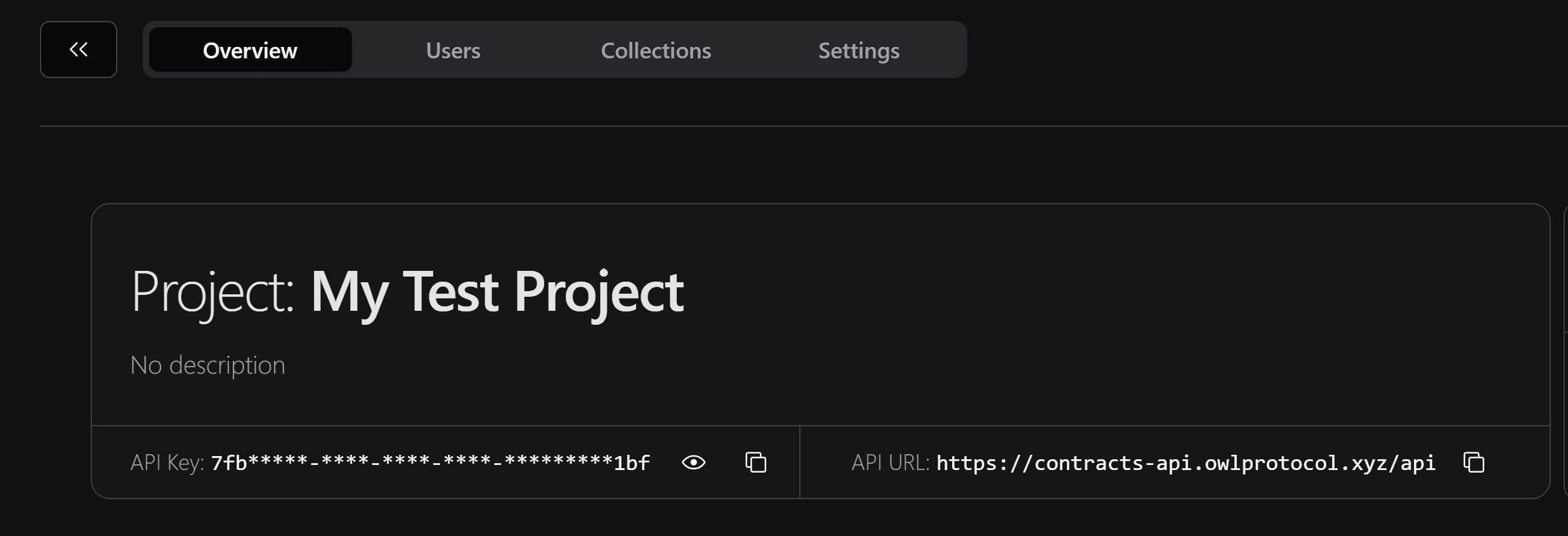Mint An Asset To A User
In this tutorial, you'll learn how to seamlessly mint an asset to a user using Owl Protocol. Along the way, we'll also cover how to deploy collections and add users to your project.
Minting assets is particularly useful for airdrops, giveaways, or any promotional campaign designed to deliver unique assets directly to your users.
Tutorials Repository
The tutorials repository contains a basic index.ts file to follow along tutorials as well as the final code of all Owl Protocol tutorials under the /tutorials folder.
Clone The Repo
We have created the Owl Protocol tutorials repository (opens in a new tab) to quickly get started. It comes set up with Typescript, viem, permissionless, and Owl Protocol SDKs.
git clone https://github.com/owlprotocol/tutorials.git owlprotocol-tutorials
cd owlprotocol-tutorialsNow, let's install the dependencies (we recommend using pnpm (opens in a new tab))
npm installThe main file we will be working with is index.ts. Let's run it to make sure everything is working
npm startIf everything has been set up correctly, you should see something similar to this printed to the console.
Welcome to Owl Protocol!
API_KEY_SECRET not found! Ensure it's correctly set in your .env file.To fix the error you will need an API Key.
Get Your API Key
Go to owl.build (opens in a new tab) to get your API Key. If this is your first time signing up, you will automatically have a default team (My Team) and a default project (My Project).
Copy the API key to your clipboard and paste it into the .env file in the tutorial template repository. This should silence the error when you run pnpm start and only show "Welcome to Owl Protocol!".
API Key
Never expose your API Key in the frontend or client-side code.
Your API Key is crucial for authenticating your requests to Owl Protocol. Always keep it secure and use it only in server-side code to prevent unauthorized access and ensure the security of your project.

Create TRPC Client
Create the client with your API key using the following command:
import { createClient } from "@owlprotocol/core-trpc/client";
// Initialize the Owl Protocol client with your API key
const client = createClient({ apiKey: API_KEY_SECRET });Add Users To Your Project
To mint an asset for a user, first add the user to your project using the createOrSet method:
/***** Create a user *****/
const user = await client.projectUser.createOrSet.mutate({
email: "leo@owlprotocol.xyz", //Owl Protocol CEO (Send me something cool!)
});To retrieve an existing user by email, you can use get method:
/***** Get a user ******/
const userExisting = await client.projectUser.get.query({
chainId: 150150, //this won't be required soon
email: "leo@owlprotocol.xyz",
});
console.debug(
`User ${userExisting.email} has smart account ${userExisting.safeAddress}`
);Launch A Collection
Deploy a new ERC721 collection using the client, or use one of your existing collections.
Set the name and symbol of your collection, and any other optional parameters.
/***** Launch a collection *****/
// The id of the blockchain we wish to connect to, replace this with any
// chainId supported by Owl Protocol.
const chainId = 150150;
const contract = await client.collection.deploy.mutate({
name: "My Collection",
symbol: "MYC",
chainId,
// Add other optional parameters
});Mint Digital Asset To User
Call collection.erc721AutoId.mint to mint an asset to the user. Provide the collection address, recipient's email, and optional asset metadata (such as name, description, and image).
/***** Mint Asset to User *****/
const image = "https://picsum.photos/200"; // Replace with your image. Make sure the image is properly hosted online.
await client.collection.erc721AutoId.mintBatch.mutate({
chainId,
address: contract.contractAddress,
to: [user.email],
metadata: {
name: "NFT #1",
description: "This was so easy!",
image,
},
});Summary
Using the Owl Protocol API & tRPC client, you have:
- Deployed an ERC721 digital asset collection
- Minted a digital asset to a user using just an email
Under the hood however, you've also leveraged several additional features implicitly:
- Used Owl Protocol's Wallet API to create wallets
- Used Owl Protocol's Account Abstraction API to sponsor transactions
To learn more about these advanced low-level APIs, check out the Gasless Transactions tutorial.